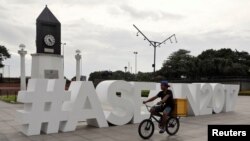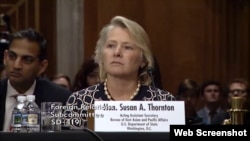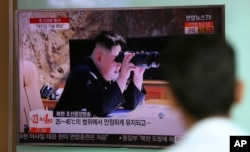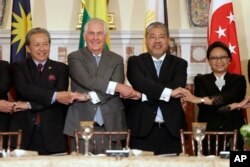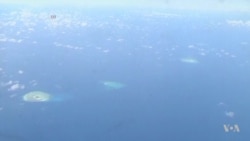As U.S. Secretary of State Rex Tillerson embarks on his first official trip to Southeast Asia this week, the United States continues to press for a legally binding mechanism to prevent conflicting territorial claims in the South China Sea from erupting into violent confrontations.
After more than 15 years of intermittent talks, foreign ministers from the Association of Southeast Asian Nations (ASEAN) and China are expected to endorse the framework of a code of conduct (COC) that commits to cooperation rather than confrontations in the disputed waters, during talks this week in the Philippines.
"The U.S. has certainly welcomed the agreement on the framework, but we are also continuing to call for the rapid adoption of an effective code of conduct," Susan Thornton, acting assistant secretary of state for East Asian and Pacific Affairs, said Wednesday in a telephone briefing.
Although the United States is not a claimant to the sovereignty over disputed islands in the South China Sea, U.S. officials have continually called for various claimants to pursue their claims peacefully and in accordance with international law.
"We'll press for due regard for legal processes, dispute resolution mechanisms, and upholding certainly international law and the U.N. Convention on the Law of the Sea," Thornton said.
During Wednesday's briefing, Thornton downplayed concerns from the region that North Korea's threats are overshadowing territorial disputes in the South China Sea.
"It certainly hasn't been knocked out of the front of our minds and it will be a focus at the upcoming meetings," she said, acknowledging that such a perception is likely based on North Korea's continuous missile tests and nuclear provocation.
Regional assistance
Still, Thornton acknowledged that Tillerson will seek greater cooperation from regional allies in isolating North Korea when he arrives for talks on Saturday.
"What we are trying to do is galvanize this pressure and isolate North Korea, so it can see what the opportunity cost is over developing these weapons programs," she noted.
But some analysts caution Washington not to create a perception of being so focused on the North Korean threat that the South China Sea and other issues important to U.S. allies in the region are overshadowed.
"Southeast Asian governments are coming to believe that they will not get practical support from the Trump administration so they cannot take risks with China," Bill Hayton of London policy institute Chatham House told VOA. "This is likely to result in them taking more timid positions and not challenging China's activities in the disputed areas."
U.S. priorities
Secretary Tillerson will travel to Manila later this week for ASEAN-related meetings, including the ASEAN Regional Forum, the East Asia Summit Ministerial, and the U.S.-ASEAN Ministerial. Then, the top U.S. diplomat will head to Bangkok and Kuala Lumpur.
Denuclearization of the Korean Peninsula, maritime security and counterterrorism are said to be high on the agenda.
The State Department said Tillerson's travel reaffirms the "administration's commitment to further broaden and enhance U.S. economic and security interests in the Asia-Pacific region."
And an initial draft of a joint statement among foreign ministers of the Southeast Asian bloc is said to reaffirm the importance and effectiveness of the "whole-of-nation approach" over "a purely military option" in combating violent extremism.
Watch: US Assures ASEAN: North Korea Will Not Overshadow South China Sea Talks




